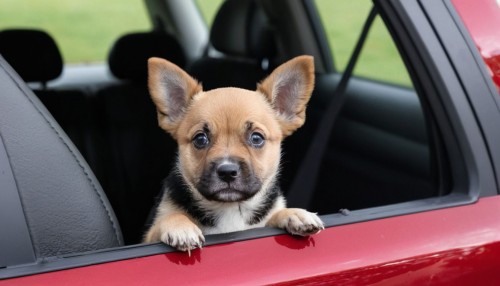
How to prevent car sickness in puppies
Send enquiry
Car sickness in puppies is a common concern for many pet owners. This condition can cause significant distress for both the puppy and the owner, making travel an unpleasant experience. Fortunately, there are several strategies you can employ to help prevent and alleviate car sickness in your furry friend. In this comprehensive guide, we will explore the causes of car sickness in puppies, preventative measures, and effective treatments.
Understanding Car Sickness in Puppies
Car sickness, or motion sickness, in puppies is typically due to the immature development of their inner ear structures, which are responsible for balance and spatial orientation. Symptoms of car sickness in puppies include drooling, whining, excessive licking, yawning, vomiting, and lethargy. Recognizing these symptoms early can help you take steps to alleviate your puppy's discomfort.
Causes of Car Sickness in Puppies
1. Immature Vestibular System
Puppies have an underdeveloped vestibular system, which is crucial for maintaining balance. As they grow, this system matures, often leading to a reduction in motion sickness.
2. Anxiety and Stress
Puppies may associate car travel with negative experiences, such as visits to the vet. This can cause anxiety and stress, which can exacerbate symptoms of car sickness.
3. Sensory Overload
The combination of unfamiliar sights, sounds, and movements can overwhelm a puppy's senses, contributing to car sickness.
Preventative Measures for Car Sickness in Puppies
1. Gradual Acclimatization
One of the most effective ways to prevent car sickness is to gradually acclimate your puppy to car travel. Start with short, calm trips around the block and gradually increase the duration as your puppy becomes more comfortable.
2. Positive Association
Create positive associations with car rides by bringing along your puppy's favorite toys or blankets. Offering treats and praise during and after the trip can also help your puppy associate car travel with positive experiences.
3. Proper Ventilation
Ensure your car is well-ventilated. Fresh air can help reduce nausea and keep your puppy comfortable. Avoid placing your puppy in a confined space where airflow is restricted.
4. Safe and Comfortable Seating
Use a well-secured crate or a pet seatbelt to keep your puppy safe and comfortable. This can prevent sudden movements and provide a sense of security, reducing the likelihood of car sickness.
5. Feeding Schedule
Avoid feeding your puppy a large meal right before a car trip. Instead, offer a light snack a few hours before travel. This can help prevent nausea and vomiting.
Effective Treatments for Car Sickness in Puppies
1. Natural Remedies
There are several natural remedies that can help alleviate car sickness in puppies. Ginger, for example, is known for its anti-nausea properties. You can give your puppy a small amount of ginger in their food or water before a trip.
2. Over-the-Counter Medications
Consult your veterinarian about over-the-counter medications that can help prevent car sickness. Dramamine and Benadryl are commonly recommended, but it's important to get the correct dosage and ensure they are safe for your puppy.
3. Prescription Medications
For severe cases of car sickness, your veterinarian may prescribe medications such as Cerenia. This medication is specifically designed to prevent vomiting and can be very effective for puppies prone to motion sickness.
4. Behavioral Training
Behavioral training can help reduce anxiety and stress associated with car travel. Techniques such as desensitization and counter-conditioning can help your puppy become more comfortable and less anxious during car rides.
Tips for a Stress-Free Car Trip
1. Regular Breaks
During long trips, take regular breaks to allow your puppy to stretch, relieve themselves, and get some fresh air. This can help prevent nausea and reduce stress.
2. Comfort Items
Bring along items that your puppy finds comforting, such as their favorite blanket or toy. Familiar scents and objects can help reduce anxiety and make the trip more enjoyable for your puppy.
3. Calm Environment
Keep the car environment as calm as possible. Avoid loud music or sudden movements, and speak to your puppy in a soothing voice to help keep them relaxed.
4. Window Position
While it might be tempting to let your puppy stick their head out the window, this can actually make car sickness worse. Instead, keep the windows slightly open to allow fresh air to circulate without overwhelming your puppy with too much sensory input.
Preventing car sickness in puppies requires patience, gradual acclimatization, and a combination of preventative measures and treatments. By understanding the causes and implementing these strategies, you can help your puppy enjoy car rides without discomfort. Always consult with your veterinarian before administering any medications or if you have concerns about your puppy's health.
Frequently Asked Questions(FAQ)
Question : What is car sickness in puppies and why does it happen?
Car sickness in puppies, also known as motion sickness, occurs when a puppy experiences discomfort, nausea, or vomiting while traveling in a vehicle. This condition is commonly caused by the inner ear's inability to handle the motion of the car, which can lead to a sense of disorientation and imbalance. Puppies are particularly prone to car sickness due to their developing inner ear structures and their limited exposure to car rides. Anxiety and stress associated with unfamiliar experiences can exacerbate the symptoms.
Most important points:
- Car sickness in puppies is also called motion sickness.
- It is caused by the inner ear's response to car movement.
- Puppies are more susceptible due to their developing inner ear and unfamiliarity with car rides.
Share this post
What service do you need? Petsfeet will help you

#10 Business Directory and Service Provider
Petsfeet provided free online business listing services and a new way to brand yourself on the internet. Add your business with petsfeet to reach out of millions of people by connecting with new customers.
Copyright © 2021 . Proudly powered by petsfeet.com











